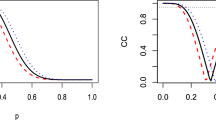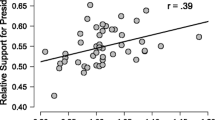Abstract
The foundations of probability are viewed through the lens of the subjectivist interpretation. This article surveys conditional probability, arguments for probabilism, probability dynamics, and the evidential and subjective interpretations of probability.
Similar content being viewed by others
Notes
In decision theoretic representation theorems, the uniqueness component also requires that the utility function be unique up to positive linear transformation, i.e., if both 〈P, U〉 and 〈P ′, U ′〉 represent the same preference ordering, then there exit some positive real number a and real number b such that U = a U ′+b.
The decision theoretic representation theorem in [45] famously fails to secure the uniqueness half of the theorem; some preference orderings are represented by a 〈P, U〉 and a 〈P ′ U ′〉 where P≠P ′. Joyce [48] shows we can regain uniqueness by supplementing Jeffrey’s constraints on preferences with additional constraints on comparative belief, and on the relationship between comparative belief and preference.
Note, however, that one can to weaken the constraints so that agents are no longer representable as expected utility maximisers, while still allowing that they have a representation that includes a unique credence function [10].
References
Anscombe, F.J., & Aumann, R.J. (1963). A definition of subjective probability. Annals of Mathematical Statistics, 34, 199–205.
Armendt, B. (1980). Is there a Dutch book argument for probability kinematics? Philosophy of Science, 47(4), 583–588.
Arntzenius, F. (2003). Some problems for conditionalization and reflection. Journal of Philosophy, 100(7), 356–370.
Arntzenius, F., Elga, E., & Hawthorne, J. (2004). Bayesianism, infinite decisions, and binding. Mind, 113(450), 251–283.
Bartha, P. (2004). Countable additivity and the de Finetti lottery. British Journal for the Philosophy of Science, 55, 301–321.
Benci, V., Horsten, L., & Wenmackers, S. Non-archimedean probability. Milan Journal of Mathematics, forthcoming.
Blume, L., Brandenburger, A., & Dekel, E. (1991a). Lexicographic probabilities and equilibrium refinements. Econometrica: Journal of the Econometric Society, 59, 81–98.
Blume, L., Brandenburger, A., & Dekel, E. (1991b). Lexicographic probabilities and choice under uncertainty. Econometrica: Journal of the Econometric Society, 59, 61–79.
Brandenburger, A., Friedenberg, A., & Keisler, H.J. (2008). Admissibility in games1. Econometrica, 76(2), 307–352.
Buchak, L. Risk and Rationality. In: Oxford University Press, Oxford, forthcoming.
Carnap, R. (1950). Logical Foundations of Probability. In: University of Chicago Press, Chicago.
Carnap, R. (1963). Replies and systematic expositions In Schlipp, P.A. (Ed.), The Philosophy of Rudolf Carnap. La Salle, IL: Open Court.
Cartwright, N. (1994). Nature’s Capacities and Their Measurement. Oxford: Oxford University Press.
Christensen, D. (1996). Dutch-book arguments depragmatized: Epistemic consistency for partial believers. Journal of Philosophy, 93(9), 450–479.
Draper, K., & Pust, J. (2008). Diachronic Dutch books and sleeping beauty. Synthese, 164(2), 281–287.
Eagle, A. (2011). Deterministic chance. Noûs, 45(2), 269–299.
Easwaran, K. (2011). Varieties of conditional probability. In Handbook for Philosophy of Statistics. North Holland.
Easwaran, K. (2013). Expected accuracy supports conditionalization—and conglomerability and reflection. Philosophy of Science, 80(1), 119–142.
Eells, E. (1991). Probabilistic Causality. Cambridge: Cambridge University Press.
Elga, A. (2000). Self-locating belief and the sleeping beauty problem. Analysis, 60(2), 143–8211.
Fetzer, J.H. (1974). A single case propensity theory of explanation. Synthese, 28(2), 171–198.
Field, H. (1978). A note on Jeffrey conditionalization. Philosophy of Science, 45(3), 361–367.
Glynn, L. (2010). Deterministic chance. British Journal for the Philosophy of Science, 61, 51–80.
Good, I. J. (1961a). A causal calculus (i). British Journal for the Philosophy of Science, 11(44), 305–318.
Good, I. J. (1961b). A causal calculus (ii). British Journal for the Philosophy of Science, 12(45), 43–51.
Greaves, H. (2004). Understanding Deutsch’s probability in a deterministic universe. Studies in History and Philosophy of Modern Physics, 35(3), 423–456.
Greaves, H., & Wallace, D. (2006). Justifying conditionalization: Conditionalization maximizes expected epistemic utility. Mind, 115(459), 607–632.
Hájek, A. (2003). What conditional probability could not be. Synthese, 137 (3), 273–323.
Hájek, A. (2005). Scotching Dutch books? Philosophical Perspectives, 19 (1), 139–8211.
Hájek, A. (2008). Arguments for–or against–probabilism? British Journal for the Philosophy of Science, 59(4), 793–819.
Hájek, A., & Hitchcock, C. Probability without tears. In: The Oxford Handbook of Probability and Philosophy. Oxford University Press, forthcoming.
Hall, N. (1994). Correcting the guide to objective chance. Mind, 103(412), 505–518.
Halpern, J. (2010). Lexicographic probability, conditional probability, and nonstandard probability. Games and Economic Behavior, 68, 155–179.
Hammond. P.J. (1994). Elementary non-Archimedean representations of probability for decision theory and games In Humphries, P. (Ed.), Patrick Suppes: scientific philosopher, (pp. 25–61). Dordrecht: Kluwer.
Hammond, P.J. (1997). Consequentialism, non-archimedean probabilities, and lexicographic expected utility In Bicchieri, R., Jeffrey, C., & Skyrms, B. (Eds.), The logic of strategy, (pp. 39–66). Oxford: Oxford University Press.
Hellman, B. (1997). Bayes and beyond. Philosophy of Science, 224, 191–221.
Hitchcock, C. (2004). Beauty and the bets. Synthese, 139(3), 405–420.
Hoefer, C. (2007). The third way on objective probability: A skeptic’s guide to chance. Mind, 116, 549–595.
Horgan, T. (2007). Synchronic Bayesian updating and the generalized sleeping beauty problem. Analysis, 67(293), 50–59.
Howson, C. (2008). De Finetti, countable additivity, consistency and coherence. British Journal for the Philosophy of Science, 59, 1–23.
Howson, C., & Urbach, P. (1993). Scientific reasoning: the Bayesian approach, 3rd edn. Chicago: Open Court.
Ismael, J.T. (2008). Raid! Dissolving the big, bad bug. Noûs, 42(2), 292–8211.
Ismael, J.T. (2011). A modest proposal about chance. Journal of Philosophy, 108(8).
Jaynes, E.T. (1957). Information theory and statistical mechanics. Physical review, 106(4), 620.
Jeffrey, R. (1983). The Logic of Decision, 2nd edn: University of Chicago Press.
Jeffreys, H. (1948). Theory of Probability, 2nd edn: Clarendon Press.
Joyce, J.M. (1998). A nonpragmatic vindication of probabilism. Philosophy of Science, 65(4), 575–603.
Joyce, J.M. (2000). Why we still need the Logic of Decision. Philosophy of Science, 67(3), 13.
Joyce, J.M. (2009). Accuracy and coherence: Prospects for an alethic epistemology of partial belief. In: Degrees of Belief, vol.342, pp. 263–297, Synthese.
Kahneman, D., Slovic, P., & Tversky, A. (1982). Judgment under uncertainty: Heuristics and biases: Cambridge University Press.
Kemeny, J. (1955). Fair bets and inductive probabilities. Journal of Symbolic Logic, 20, 263–73.
Keynes, J.M. (1921). A Treatise on Probability. London: Macmillan.
Kierland, B., & Monton, B. (2005). Minimizing inaccuracy for self-locating beliefs. Philosophy and Phenomenological Research, 70(2), 384–395.
Koller, D., & Friedman, N. (2009). Probabilistic graphical models: principles and techniques: MIT press.
Kolmogorov, A.N. (1933). Grundbegriffe der Wahrscheinlichkeitrechnung. volume translated as Foundations of Probability, 1950. New York: Chelsea Publishing Company.
Konek, J. On the role of representation theorems. manuscript.
Kullback, S., & Leibler, R.A. (1951). On information and sufficiency. The Annals of Mathematical Statistics, 22(1), 79–86.
Kvart, I. (2004). Causation: Counterfactual and probabilistic analyses. In Causation and Counterfactuals: Mit Press.
Lehman, R.S. (1955). On confirmation and rational betting. The Journal of Symbolic Logic, 20(3), 251–6.
Lehmann, D., & Magidor, M. (1992). What does a conditional knowledge base entail? Artificial Intelligence, 55(1), 1–60.
Leitgeb, H., & Pettigrew, R. (2010a). An objective justification of Bayesianism ii: The consequences of minimizing inaccuracy. Philosophy of Science, 77(2), 236–272.
Leitgeb, H., & Pettigrew, R. (2010b). An objective justification of Bayesianism i: Measuring inaccuracy. Philosophy of Science, 77, 236–272.
Lewis, D.K. (1980). A subjectivist’s guide to objective chance In Jeffrey, R. (Ed.), Studies in Inductive Logic and Probability, Vol. 2: University of California Press. Reprinted in Lewis 1986, pp. 83–113.
Lewis, D.K. (1994). Humean supervenience debugged. Mind, 103, 473–490. Reprinted with postscripts in Lewis 1986, pp. 83–132.
Lewis, D.K. (1999). Why conditionalize?. In Papers in Metaphysics and Epistemology (pp. 403–407). Cambridge: Cambridge University Press.
Lewis, D.K. (2001). Sleeping beauty: Reply to Elga. Analysis, 61(3), 171–8211.
Loewer, B. (2001). Determinism and chance. Studies in History and Philosophy of Science Part B, 32(4), 609–620.
Loewer, B. (2004). David Lewis’s Humean theory of objective chance. Philosophy of Science, 71(5), 1115–25.
Lyon, A. (2010). Deterministic probability: Neither chance nor credence. Synthese, 182(3), 413–432.
Maher, P. (1997). Depragmatized Dutch book arguments. Philosophy of Science, 64(2), 291–305.
Maher, P. (2002). Joyce’s argument for probabilism. Philosophy of Science, 69(1), 73–81.
Meacham, C. (2005). Three proposals regarding a theory of chance. Philosophical Perspectives, 19, 281–307.
Meacham, C., & Weisberg, J. (2011). Representation theorems and the foundations of decision theory. Australasian Journal of Philosophy, 89(4), 641–663.
Mellor, D.H. (1995). The Facts of Causation: Routledge.
North, J. (2010). An empirical approach to symmetry and probability. Studies in History and Philosophy of Science Part B, 41(1), 27–40.
Pearl, J. (2009). Causality: Models, Reasoning, and Inference, 2nd edn: Cambridge University Press.
Pettigrew, R. (2012). Accuracy, chance, and the Principal Principle. Philosophical Review, 121(2), 241–275.
Popper, K. (1959). The Logic of Scientific Discovery, chapter 4 ∗, (pp. 326–348): Harper & Row.
Rényi, A. (1970). Foundations of Probability: Holden-Day.
Roberts, J.T. (2001). Undermining undermined: Why Humean supervenience never needed to be debugged (even if it’s a necessary truth). Proceedings of the Philosophy of Science Association, 2001(3), S98.
Savage, L.J. (1972). The Foundations of Statistics, 2nd edn: Courier Dover Publications.
Schaffer, J. (2007). Deterministic chance. British Journal for the Philosophy of Science, 58, 113–140.
Scott, D. (1964). Measurement structures and linear inequalities. Journal of Mathematical Psychology, 1, 233247.
Seidenfeld, T. (1979). Why i am not an objective Bayesian; some reflections prompted by rosenkrantz. Theory and Decision, 11(4), 413–440.
Seidenfeld, T. (1986). Entropy and uncertainty. Philosophy of Science, 53(4), 467–491.
Seidenfeld, T. (2001). Remarks on the theory of conditional probability: Some issues of finite versus countable additivity. In Probability Theory: Philosophy, Recent History and Relations to Science. Kluwer: Synthese Library.
Sklar, L. (1993). Physics and Chance: Philosophical Issues in the Foundations of Statistical Mechanics: Cambridge University Press.
Skyrms, B. (1980). Coherence In Rescher, N. (Ed.), Scientific Inquiry in Philosophical Perspective, (pp. 225–42): University of Pittsburgh Press.
Skyrms, B. (1985). Maximum entropy inference as a special case of conditionalization. Synthese, 63(1), 55–74.
Sober, E. (2010). Evolutionary theory and the reality of macro probabilities. In The Place of Probability in Science, (Vol. 284 pp. 133–60): Springer.
Spirtes, P., Glymour, C., & Scheines, R. (2000). Causation, Prediction, and Search, 2nd edn. Cambridge: MIT Press.
Spohn, W. (2001). Bayesian nets are all there is to causal dependence In Galavotti, M.C., Suppes, P., & Costantini, D. (Eds.), Stochastic Dependence and Causality: CSLI Publications.
Strevens, M. (2003). Bigger Than Chaos: Understanding Complexity Through Probability: Harvard University Press.
Suppes, P. (1970). Probabilistic Theory of Causality: Humanities Press.
Teller, P. (1973). Conditionalization and observation. Synthese, 26(2), 218–258.
Titelbaum, M.G. (2010). Not enough there there: Evidence, reasons, and language independence. Philosophical Perspectives, 24(1), 477–528.
Titelbaum, M.G. Self-locating credences. In: The Oxford Handbook of Probability and Philosophy, Oxford University Press, forthcoming.
Uffink, J. (1996). The constraint rule of the maximum entropy principle. Studies in History and Philosophy of Science Part B, 27(1), 47–79.
van Fraassen, B.C. (1984). Belief and the will. Journal of Philosophy, 81(5), 235–256.
van Fraassen, B.C. (1989). Laws and Symmetry: Oxford University Press.
Villegas, C. (1964). On qualitative probability sigma-algebras. The Annals of Mathematical Statistics, 35, 1787–1796.
Vineberg, S. (2011). Dutch book arguments In Zalta, E.N. (Ed.), The Stanford Encyclopedia of Philosophy. http://plato.stanford.edu/archives/sum2011/entries/dutch-book.
Wagner, C. (2002). Probability kinematics and commutativity. Philosophy of Science, 69, 266–278.
Weintraub, R. (2004). Sleeping beauty: A simple solution. Analysis, 64(1), 8–8211.
Weisberg, J. (2009). Commutativity or holism? a dilemma for conditionalizers. British Journal for the Philosophy of Science, 60(4), 793–812.
Williams, J.R.G. (2012). Generalized probabilism: Dutch books and accuracy domination. Journal of Philosophical Logic, 41(5), 811–840.
Williams, P. M. (1980). Bayesian conditionalisation and the principle of minimum information. British Journal for the Philosophy of Science, 31(2), 131–144.
Williamson, J. (1999). Countable additivity and subjective probability. British Journal for the Philosophy of Science, 50(3), 401–416.
Williamson, J. (2004). Bayesian Nets and Causality: Philosophical and Computational Foundations: OUP Oxford.
Wilson, N. (1995). An order of magnitude calculus. In Proceedings of the Eleventh conference on Uncertainty in artificial intelligence (pp. 548–555): Morgan Kaufmann Publishers Inc.
Zabell, S.L. (2011). Carnap and the logic of inductive inference In Gabbay, D.M., & Woods, J. (Eds.), Inductive Logic. North Holland.
Zynda, L. (2000). Representation theorems and realism about degrees of belief. Philosophy of Science, 67(1), 45–69.
Author information
Authors and Affiliations
Corresponding author
Rights and permissions
About this article
Cite this article
Briggs, R. Foundations of Probability. J Philos Logic 44, 625–640 (2015). https://doi.org/10.1007/s10992-015-9377-3
Received:
Accepted:
Published:
Issue Date:
DOI: https://doi.org/10.1007/s10992-015-9377-3




